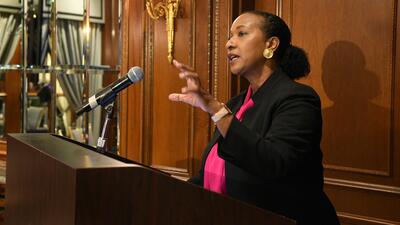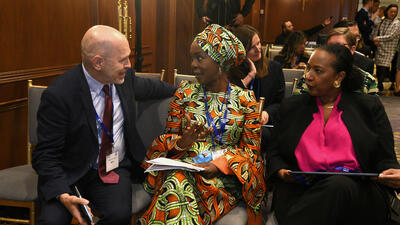
ITC Executive Director opening remarks at the 2023 Good Trade Summit
Good morning, excellencies, ladies and gentlemen, and welcome to the Good Trade Summit.
I’m delighted to be with you in New York today, and I’d especially like to recognize our partners, the Business Council for International Understanding. Thank you, Peter, for being our friend and stalwart collaborator as we work with companies throughout global supply chains towards a more sustainable future.
I’m thrilled to share this opening panel with Toyin Ojora Saraki, whose impressive advocacy and philanthropic work on behalf of women, infants, and children is changing the conversation around healthcare in Africa and around the world. It’s work that resonates deeply with me, both as a mother myself and as the executive director of an agency that believes firmly in inclusion and women’s economic empowerment. As we take in the lessons from the SDG Summit and prepare for the future, we need people like Toyin and organizations like The Wellbeing Foundation Africa to help us chart a better path towards sustainability.
We heard sobering news this week at the SDG Summit: that for most of the Sustainable Development Goals, we are well off track. Scarier still, in some cases we’re going backwards, worse off now than when the 2030 Agenda for Sustainable Development was adopted eight years ago.
With climate change, the news is also grim. This month, the UN Framework Convention on Climate Change shared a new report outlining findings from technical talks on climate change mitigation under the Global Stocktake, a process which concludes at COP28 this year. Unfortunately, this report confirms our fears: that we have a “rapidly narrowing window” for staying with the Paris Agreement’s 1.5°C temperature limit.
The UNFCCC report also reaffirmed what we’ve learned from our own work at the ITC: that future decisions about climate action must be driven by equity, and that “those most affected by climate impacts should be involved in crafting solutions.”
This is key. Over 90 percent of the world’s businesses are small enterprises. They are drivers of jobs and growth, and pillars of their communities and the global economy alike. They are also often on the frontlines of climate change. Without the active involvement of small businesses, especially in developing countries, we will fail at achieving the SDGs and we will be unable to avert catastrophic global warming. This failure will affect us all.
In concrete terms, that failure would lead to more people being unable provide healthy food for their families. It would lead to more people displaced from their homes due to climate change. It would lead to our natural resources becoming so depleted that we will struggle to fulfil our most basic needs, such as clean water. It’s why I work in this field: because I believe the story of sustainable development needs a better ending.
To avoid these outcomes, we must reshape our global economic frameworks so that they better serve the SDGs. But we also need the private sector to take an active part in making the transition towards more sustainable production and consumption practices a reality. This is an effort that must bring all businesses together, large and small. That is why we’re here today: to talk about trade, and especially the role of the private sector, in moving us towards a better path.
Trade has a vital role to play in helping the SDGs stay within reach. Trade can also, if we’re not careful, get in the way. We must ensure that our efforts towards greater sustainability do not come at the expense of the small businesses that serve as the backbone of the global economy.
That’s why we need to work with small businesses to help them prepare for the future. We already know that we cannot avoid some of climate change’s worst impacts, but we can work with small businesses so they are better prepared. We can work with them to ensure they remain competitive in an increasingly crowded market, especially as they work to comply with an ever-growing number of sustainability regulations and standards. We can work with them as they develop innovative new approaches to their production practices, including through the use of new technologies. We can help them build their resilience to shocks—whether these come from a changing climate, from public health crises, from conflicts, or from other challenges still on the horizon.
When we talk about sustainability, we often look at big picture goals: averting deforestation, mitigating climate change, ending forced labour. These are important objectives. But we must also remember that if we don’t design policies, regulations, and practices with the needs of small businesses in mind, we can cause more harm than good. The risk, if we’re not careful, is that these businesses will be shut out of international markets and global supply chains, making us all the poorer for it.
This is why the ITC works actively with small businesses to give them the market information they need as they make their decisions, help link them with international buyers, build their capacity on implementing sustainability standards and other regulations, and improve their digital connectivity. These steps are crucial for ensuring these businesses can be competitive on the international stage, while helping deliver on the Sustainable Development Goals.
Today, we’re seeing a growing commitment from large multinational businesses to make supply chains more sustainable, and to do so in a way that empowers and supports smaller enterprises. At the ITC, this is the kind of news that drives us and helps us see what’s possible. And we have an exciting announcement to make this morning: today, we’re launching a “Call to Action” dedicated to “Uniting Sustainable Actions.”
What’s the idea behind this “Call to Action”? For large companies, institutions, and other organizations working across global supply chains to commit to abiding by five core principles, which together can move us closer to achieving the SDGs. This Call to Action brings together over 70 signatories that are innovators in their respective fields—and there is room at the table for more to join!
The Call to Action signatories include among them the full membership of the Initiative for Compliance and Sustainability, an international effort devoted to making working conditions better across various sectors, from textiles and garments to electronics and furniture. Many of these businesses are household names, and their influence extends throughout the world. The signatories also include international bodies, like the United Nations Economic Commission for Europe; leading standards such as the Global Organic Textile Standard; and our Good Trade Summit co-host, the Business Council for International Understanding.
What does this Call to Action entail? Its five principles are small business empowerment, sustainability, transparency, collaboration, and digitalization. These aren’t just buzzwords: they are principles that are integral to changing how our supply chains work, and for the better.
For instance, these companies collectively recognize the value of transparency and are sharing publicly what they’ve learned about what works well and what doesn’t. This provides a valuable learning opportunity for smaller businesses and is a major step towards building trust and strong relationships throughout the value chain.
I’ll give you an example of what this looks like in practice: JOTT, a jacket manufacturer who has signed onto the Call to Action, now has on its website its entire suppliers list—and you can see their full supply chain in ITC’s Sustainability Map.
As we look ahead, I hope you take this message to heart: we cannot achieve sustainable development without trade, and small businesses are integral to that effort. COP28 will be the first big checkpoint for the Paris Agreement, and the UAE’s COP presidency has, for the first time in the history of the UN climate talks, included a thematic day on trade. As we prepare for these conversations and those still to come, it is essential that small businesses have a seat at the table.
If done right, trade can help us get on a healthier path. We can look forward to economic growth that is far more inclusive and sustainable than the growth models of the past. We can look forward to food systems and supply chains that provide good jobs and ensure no one goes hungry. We can envision more women owning and leading businesses, and see these businesses be competitive on the international market. These are just a few examples of what’s possible. I look forward to discussing more today.
Thank you all.






